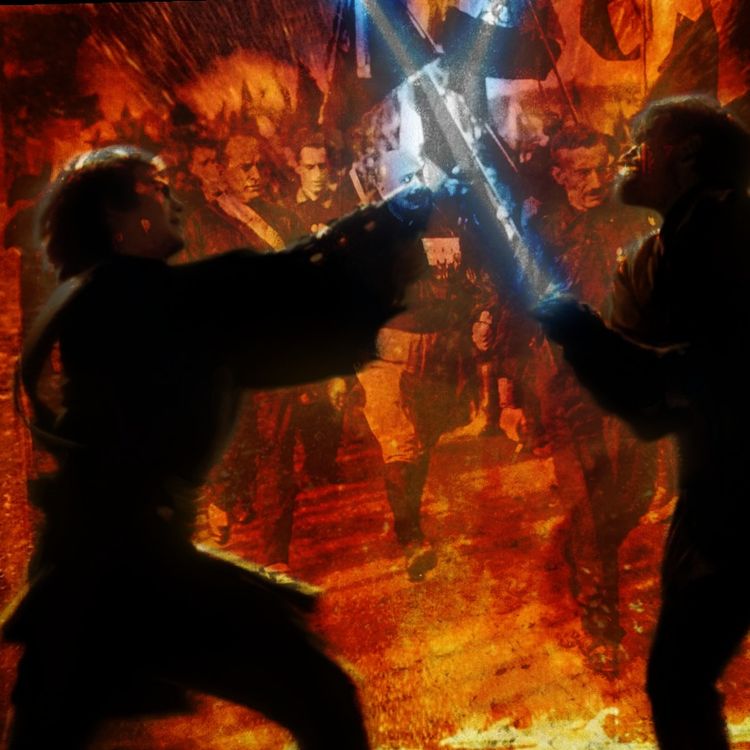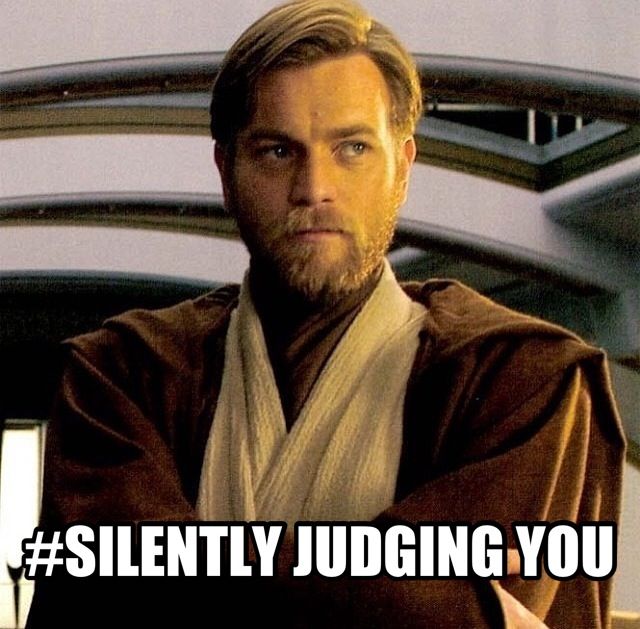Decline And Fall Free: The Fall of Padme Amidala

Hey, folks! No April Fools here — our series of big features on Star Wars continues to roll on with this week's entry, on the much-maligned prequel entry Attack Of The Clones.
Saul took the lead on this one, and produced a pretty smashing bit of historical and narrative analysis. Paid subscribers can access the whole 8,000 word entry, which are more words than anyone probably should devote to a deep reading of a frankly pretty bad movie. (But that's the Heat Death promise: we dig deep so we can share anything interesting we find.)
And as it turns out, there's a lot of interesting stuff bubbling in Attack of the Clones. In this free excerpt, we discuss the film's most overlooked tragedy: how Padme Amidala failed to rise to the most important moment of her life.
Enjoy, and be sure to subscribe if you'd like to support work like this.
The Fall of Padme Amidala
Attack of the Clones, it must be said, is a weird movie: perhaps the most genre-bending of the Star Wars films. There’s something gleeful about its willingness, nay, commitment to smashing together as many of the great genres of American blockbuster as possible. It is a costume drama, full of heaving bodices and loud declaiming. Then it is a twisty noir mystery, full of clues and tradecraft. Then it is a smoldering will-they-won’t-they romance. Finally, it is a war movie, with gunships and open set piece battles between Republic and Separatists.
The novelty of this approach was not appreciated at the time. The film made $658 million — over a billion dollars in today’s currency — but seemed to do so without anyone really … liking it. In particular, the romance in the film was greeted with hoots of derision when it premiered. Even now, with the prequel reclamation project fully underway, it is not fondly regarded.
This makes sense, because the relationship between Anakin Skywalker and Padme Amidala is deeply unsettling, whether intentionally or otherwise. When Kenobi heads off in search of his missing planet, and the source of the plot to kill Amidala, he leaves his apprentice to guard the Senator in a secluded lake house on Naboo.
Given that he seems to have noticed how Skywalker looks at Amidala — “Your thoughts betray you, Anakin'' — as well as his apprentice’s issues with impulse control, it is hard to call this anything but negligence. And indeed, with the two of them left alone, the vibes are all kinds of off. Skywalker is clearly obsessed with her. He doesn’t easily take no for an answer; acting (fairly persuasively, you have to admit) like an entitled teenager, elbowing his way into her space, turning every conversation into double-entendres and come-ons. Amidala is clearly put off by him at first, and not in a particularly sexy way: she’s five years older than him, last saw him as a small child, and clearly feels no initial romantic attraction toward him at all.
This was often dismissed when the movie came out as bad acting, or bad casting. But there’s a more disturbing reading available, given the forced nature of their interactions, the Jedi facility with mental magic, and Anakin’s often mentioned raw power: that he is in some sense controlling or influencing her, deliberately or otherwise. The film actually raises that possibility, incidentally—during a grassy picnic on Naboo, when Amidala playfully asks if Anakin is going to use a Jedi mind trick on her, he laughingly responds that “they only work on the weak-minded."
Which, reader, is not precisely a “no.”
Either way, three crucial things happen between them, which will set the stage for everything that follows — and we really do mean everything, in this movie and the rest of them. Let’s take them one at a time.
First, Anakin Skywalker and Padme Amidala fall in love, however awkwardly and with whatever creepy, unsettled questions about consent. Not much to say about this: it’s fated, so it happens — adding “doomed romance” to the list of literary tropes we’re working with. Skywalker is a sworn celibate; Amidala a (supposedly) powerful Senator. It’s not good for either of them, but they do it anyway, and the tension between those two things will propel the next phase of the story.
Then, in a small moment that looms large in hindsight, Skywalker debates with Amidala about politics while picnicking on Naboo. He tells her he doesn’t think the system works; she, teasing, asks him how he’d want it to. His response is earnest: “We need a situation where the politicians sit down and discuss the problem and agree what’s in the best interest of all the people and then do it,” he says.
She smiles. “That’s exactly what we do. The trouble is that people don’t always agree.”
He doesn’t smile. “Well, then they should be made to.”
When you first watched this, it likely felt a bit heavy handed. Today, however, it recalls every bit of early-COVID fulminating by tech influencers on the best way to fight a pandemic. Growing up, Skywalker was many things, but foremost among them was a self-taught engineer. His view of society is, perhaps, an engineer’s view: a vast machine, its ailments as bugs or broken parts, requiring a strong and dispassionate hand to repair it.
This is, of course, a deeply reactionary mindset. But it also bespeaks a person whose entire identity rests around his ability to repair things. And if the tragedy of the Jedi is their inability to integrate or understand passion, then the deep and abiding tragedy of Anakin’s life is that he is, at heart, a fixer. And one who will manage to break everything he touches.
But it’s also worth noting that Amidala doesn’t present any real rebuttal to the arch-conservative position. Her response— “That sounds an awful lot like a dictatorship to me”— is clearly meant to be a trump card. Thus she is flummoxed by Annakin’s sly, joking-but not-joking, “Well, if it works…”
There’s a lot that she could potentially have said to him. That when one person captures the full authority of the state, it tends to rot them —and if not them, then their children. That whatever good they can do in a few years of unitary rule — think of young, swaggering Saddam Hussein or Muhammar Qadaffi, building public works and cutting through red tape — is well outweighed by all the damage they do after.
She could have added, perhaps, that their oppression is perhaps the least of it — what’s worse is the bad government that the oppression ends up covering for, as the leader becomes paranoid and isolated, both micromanaging and out-of-touch, as critical problems go perennially unsolved. That the constant, grinding tension of democracy now staves off far worse, far more sudden cataclysm later.
But the Republic has had a thousand years of peace, remember? It may be that no one now remembers anything else, and that “Democracy is good and dictators are bad” is a liberal piety that everyone holding to the civic religion of the Republic says without much thinking about it, or much ability to defend in front of skepticism. As Queen Jamilla, the new (elected) ruler of Naboo’s human population tells Amidala, “The day we stop believing democracy can work is the day we lose it.”
That’s both a heavy-handed foreshadowing and tip-of-the-hand by Lucas about the threat posed by Anakin. Watching in 2022, it was easy to empathize with the wish for someone to just make things work — and also with Amidala’s inability to explain just why that urge didn’t lead anywhere good. Between that impasse, the state is falling apart.
But all this is largely foreshadowing, because their pastoral idyll is quickly interrupted by nightmares. Skywalker dreams his mother Shmi — whom he was forced to leave behind on Tatooine when he was ‘rescued’ from slavery — is in mortal peril. Ever impulsive, he announces he’s setting off to find her — equally impulsive, she announces she’s going with him.
After that, things happen quickly. The senator and the warrior monk return in her chrome spaceship to Tatooine — a frontier planet where Skywalker grew up, and which he hasn’t returned to in years. He returns to the junk shop owner who used to own him and his mother, who tells him that he sold her to a “moisture farmer,” who freed and married her. (Another place in Star Wars, incidentally, where the consensual nature of a relationship is somewhat … iffy.)
That moisture farmer named Lars welcomes Skywalker and Amidala in, where they meet his son and soon-to-be daughter in law — a nice pair, Owen and Beru, who will play a pivotal role in a later phase of the story. A grim Lars reveals that Skywalker’s mother has been taken by the Tusken Raiders, sometimes called Sand People — an indigenous, apparently nomadic group of Tatooineans who likely preceded the human colonization, which seems to have pushed them to the edges of society, from which they eke out a living raiding the settlements of the colonists.
Sometimes the Tusken bands take prisoners, and it seems those prisoners do not often survive. And thus when Skywalker finds his mother tied up inside a Tusken camp, she’s already at death’s door. She lives just long enough to recognize him, and to tell him how proud she is before dying in his arms. Her death leaves Anakin sitting alone in the dark, stewing in his own terrible guilt, regret — and rage. A lightsaber ignites against the wall of a tent, and soon enough the desert air is split by screams.
And then Skywalker is back with Amidala, who is softening towards him. He is clearly distraught; she asks him why, and it comes out in a burst. “I... I killed them,” he almost shouts. “I killed them all. They're dead. Every single one of them... and not just the men, but the women and the children too. They're like animals, and I slaughtered them like animals! I hate them!”
The whole thing is a bleak warning of what lies ahead for Skywalker. He is confessing to a war crime: the wholesale slaughter of noncombatants by a self-appointed executioner. Perhaps worse, from the perspective of the Jedi, he admits that he has done it through a loss of control — a crime of passion, as his power overcame him and left death in his wake that he did not intend.
But Amidala’s response to it is generally overlooked, and actually quite interesting: she tells him his anger is natural, and then the two leave it there. (She also apparently never tells anyone — until, perhaps, the violence has come home, at which point it’s too late.) The moment plays very oddly against everything we’ve seen about her so far: her professed love of good governance, her paeans about the horrors of war. Her forgiveness of Anakin’s massacre — or willingness to ignore it, or compartmentalize it — also suggests something not at all flattering about her: that she doesn’t regard wanton violence against the indigenous people of Tatooine as such a big deal.
Given that she’s from Naboo — a planet where the indigenous people largely live underwater, and until recently had no real voice in planetary (which is to say, human settler) affairs — it raises some dark questions about what she considers to be acceptable violence, and how far she believes the rule of law is really supposed to go.
Above all, however, the romantic tensions of the film serve a critical purpose: they take Amidala off the board at the time when her guidance — in the name of peacethe cause of staving off war — is most needed in the Senate. Maybe a better way to say this is that she allows herself to be moved off the board, ostensibly for her own safety, by Chancellor Palpatine, at the precise time when things are at their most fraught, and the question of whether the Republic will militarize is most active. She opens the movie fulminating about the dangers of war, and then quickly leaves town to save her own skin. By the time she returns, it will be, again, far too late.
Whether this is a mistake, an example of moral cowardice or a function of Palpatine’s skill at sizing up and dispatching rivals — or some combination of the three — doesn't really matter. What matters is that Amidala ultimately ends up enthusiastically in the middle of the conflict that kicks off the war she has been trying to avoid. It wouldn’t even be much of a stretch to say that she does her best to provoke it.
All of which is to say: the saga of the first trilogy of Star Wars is supposed to be about the fall of Anakin — and the Republic — to the Dark Side. But in her own way, faced with her moment, Amidala falls too, and her fall is in many ways the more tragic and pathetic, because it forces her to look right at her ideals and betray them, right at the moment when they matter most.
To read the rest of the feature, you can upgrade to a paid subscription for just $5 a month, which will give you access to all paywalled material, as well as the ability to leave comments on articles. See you there!






Member discussion